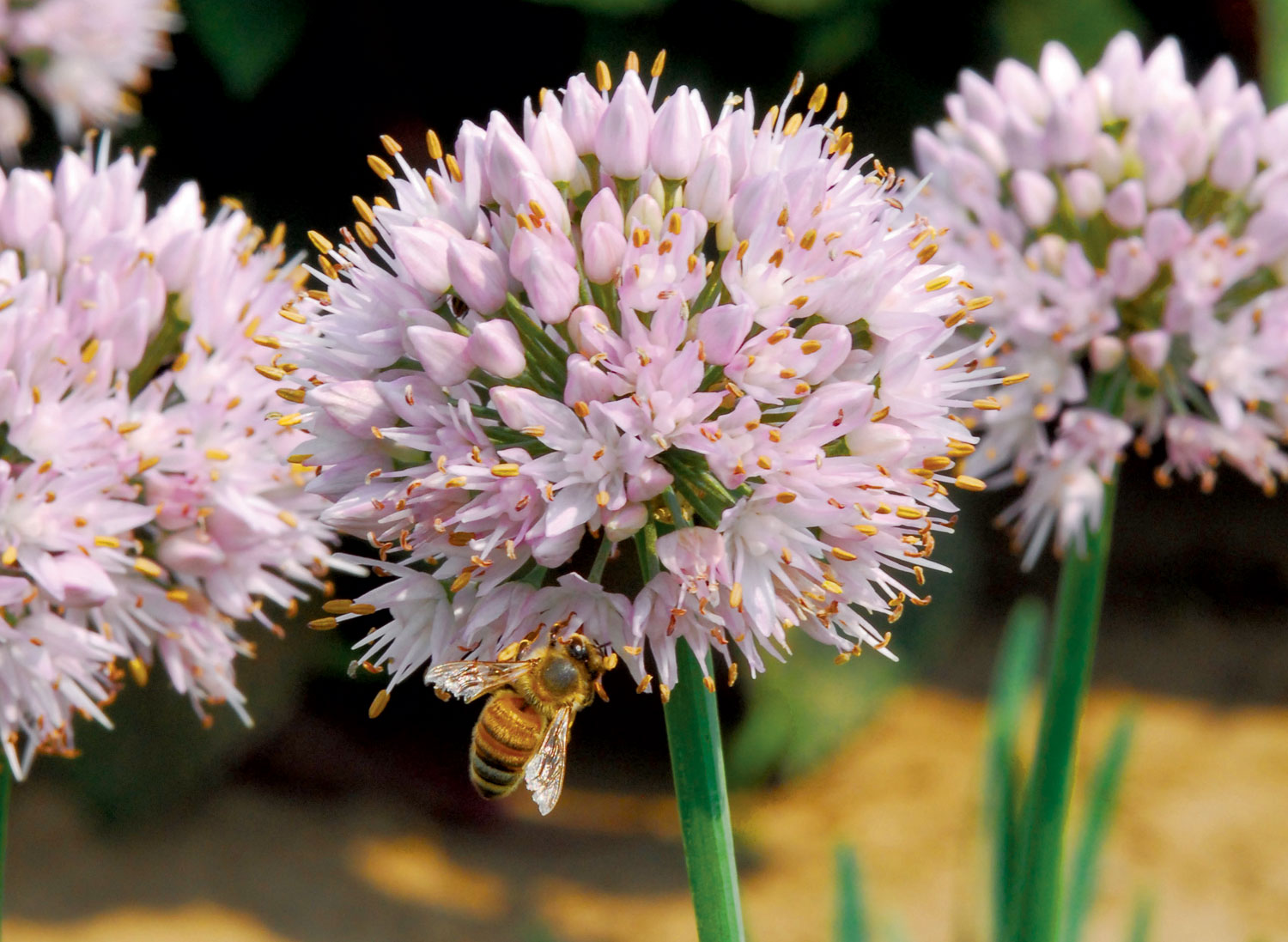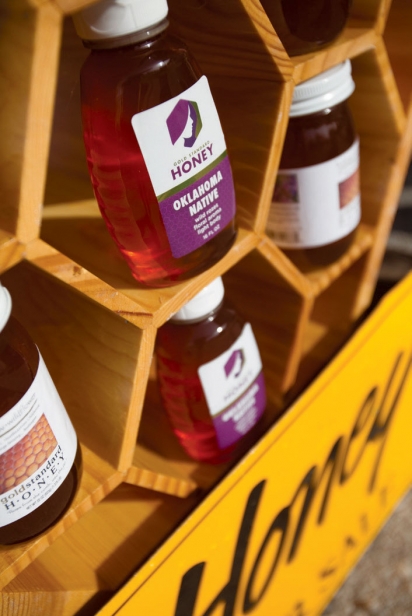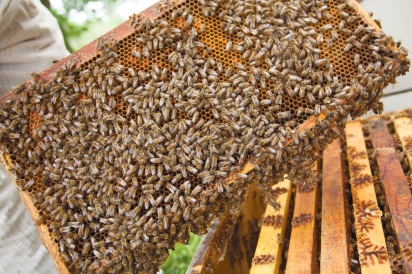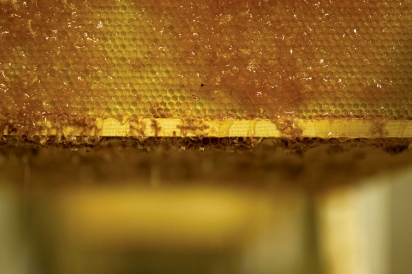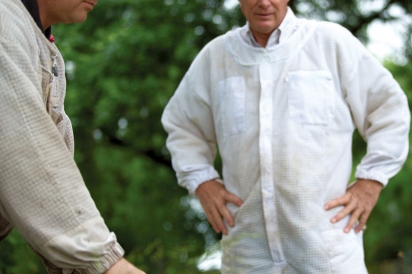The Sweeter Side of Honey
Did you know that honey has been such an important part of human beings’ diet for so long that even the ancient Egyptians included honey with their burials? Archaeologists have even found references to bees and beekeeping in hieroglyphics dating back nearly 4,500 years.
What makes honey so special? To answer this question and tell me more about honey, and particularly Oklahoma honey, I spoke with resident beekeeper and honey guru George Brining, owner and operator of Gold Standard Honey.
To say Brining is knowledgeable about bees and honey is not giving him enough credit. Not only is he educated in all things bees, but he also has an enthusiasm that is contagious.
“My heart is really in raising things and growing things,” he says. “I’ve always had a hankering, for some reason, to want to raise bees.” In fact he was so interested in bees that he owned a bee suit for years before he even obtained any hives.
Brining is a retired teacher and comes from a background in farming, but keeping bees and harvesting honey is very different. “There is a steep learning curve working with bees,” he says.
Fortunately he had his own great teachers in his friends Dustin and Nick Neuenschwander and their late father, Loren. These same teachers are a part of the beekeeper group that now Brining belongs to and it is this group that provides the honey for Gold Standard. In total, they have about 3,800 hives, with the amount varying throughout the year, and they are all located in Mayes County. George has also found a great friend and confidant in this group, beekeeper Shannon Wallace, who as well as contributing to Gold Standard Honey provides good advice and acts as a sounding board for him.
He says people always think it’s going to be romantic when they talk about beekeeping, but it is a lot of hard work. This is said with a big grin on his face, a grin that says the work and the bees are part of why he enjoys it so much. This fervor might come from growing up on a farm, but I suspect that his respect for the bees—and, more notably, the wonderful product they produce—has much more to do with it.
Respecting the bees includes keeping them happy and that, as Brining explains it, is an important part of a beekeeper’s job. He emphasizes the importance of splitting the hives during the spring, because this is essential to keeping his bees happy. When hives become crowded it is his job as their caretaker to expand the hive into multiple hives. He essentially relocates some of his bees and creates a type of beehive condo, with the queen staying in her same hive.
Ensuring that the hives grow and continue reproducing is essential to Brining’s future honey harvest, but bees are also essential to the growth of so many of the plants we love. The somewhat mysterious die-off epidemic known as Colony Collapse Disorder is something that every beekeeper struggles with in today’s world of honey. Asked about this, Brining just shook his head. He said there are times that a beekeeper will go out to the hive, open the box and every single bee inside will be dead or all the bees are gone. Though the causes are thought to be many, Brining has a few key suspects.
One is Varroa mites—similar to ticks on a dog, these mites attach to the bees and infect them with a virus and thus infect the entire hive. Others are the overall decreased forage for the bees to pollinate, and the increasing usage of pesticides. With the pollination services of bees essential to a large portion of the human diet, controlling Colony Collapse Disorder makes the work Brining is doing all that more important.
He describes working his own hives as “almost like therapy, especially this time of year. Spring is wonderful.” And he speaks of the beehives with reverence, describing them as “one of the cleanest environments in nature.” This reverence is carried over into his honey as he speaks with a devotion that is similar to a sommelier talking about a favorite vintage or a cheesemonger discussing the nuances of different cheeses.
“Honey is an incredible food,” Brining says.
He reasons that for some people honey might just taste the same no matter where it comes from, but that is not necessarily the case with Gold Standard. Brining is focused on providing single-origin wildflower honey. This means that his honey comes from one location, the hives in Mayes County. This also means that each vintage is different: Just like variations in grapes each year produce different wines, a different vintage of honey is produced each year.
This honey is completely raw; there is no filtration, cooking or diluting, so all of the pollen from the wildflowers stays in the honey. The bees are going to pollinate different flowers and a different amount of those flowers every season, so you might get, for example, a higher percentage of clover one year and perhaps a higher percentage of rose another year. This also means the flavors and the color of the honey will change.
This is something Brining takes great pride in. Because the honey changes each year, it proves to his customers that this honey is a completely natural, undisturbed product. He also believes there should be “truth in honey labeling,” meaning he goes to great lengths to show his customers exactly what is in his honey. Every vintage is sent to a pollen laboratory at Texas A&M to be analyzed. Once the professional pollen analysis is completed they have the exact makeup of pollens and mineral content contained in that vintage of honey. This is attached to each bottle of honey so consumers can be confident in where their honey is coming from and know exactly what kind of honey they are consuming.
It might taste just like a simple, sweet nectar, but honey also contains small amounts of minerals like calcium, iron and potassium, so aside from being a natural sweetener, another beneficial side effect of raw honey is the capability to provide some nutrients to your body. Some honey has even been shown to contain antioxidants that help fight for your heart’s health.
“It’s not just a comfort food, it has health benefits too,” says Brining. “It has protein, B vitamins and minerals that are good for you.”
Another benefit, in particular of local, raw honeys, is that they carry a sort of vaccination against local allergens. The natural way honey is produced, through pollination, means that those same pollens are then carried over into the honey itself. Brining is such a devotee to his honey and its health benefits that he eats a few teaspoons a day to ward off allergies. Now that is a pill that is very easy to swallow.
Brining might not be taking after the Egyptians and carving hieroglyphics to educate consumers on bees and honey, but he is definitely doing his part to bring this completely natural, millennia-old delight to Oklahomans.
“I’m cultivating the market in order to get out a quality artisan product to the average person,” he says.
For more information about beekeeping, Gold Standard Honey or where you can get your hands on some, visit GoldStandardHoney.com.


